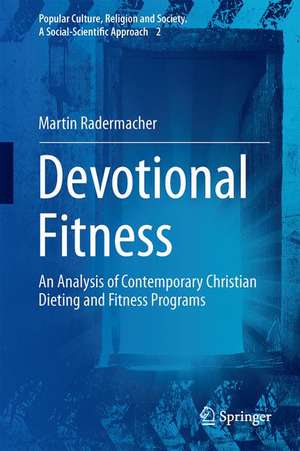Devotional Fitness: An Analysis of Contemporary Christian Dieting and Fitness Programs: Popular Culture, Religion and Society. A Social-Scientific Approach, cartea 2
Autor Martin Radermacheren Limba Engleză Hardback – 12 ian 2017
| Toate formatele și edițiile | Preț | Express |
|---|---|---|
| Paperback (1) | 583.61 lei 6-8 săpt. | |
| Springer International Publishing – 14 iul 2018 | 583.61 lei 6-8 săpt. | |
| Hardback (1) | 589.84 lei 6-8 săpt. | |
| Springer International Publishing – 12 ian 2017 | 589.84 lei 6-8 săpt. |
Preț: 589.84 lei
Preț vechi: 693.92 lei
-15% Nou
Puncte Express: 885
Preț estimativ în valută:
112.87€ • 122.98$ • 95.11£
112.87€ • 122.98$ • 95.11£
Carte tipărită la comandă
Livrare economică 23 aprilie-07 mai
Preluare comenzi: 021 569.72.76
Specificații
ISBN-13: 9783319498218
ISBN-10: 3319498215
Pagini: 290
Ilustrații: IX, 275 p. 5 illus.
Dimensiuni: 155 x 235 x 18 mm
Greutate: 0.58 kg
Ediția:1st ed. 2017
Editura: Springer International Publishing
Colecția Springer
Seria Popular Culture, Religion and Society. A Social-Scientific Approach
Locul publicării:Cham, Switzerland
ISBN-10: 3319498215
Pagini: 290
Ilustrații: IX, 275 p. 5 illus.
Dimensiuni: 155 x 235 x 18 mm
Greutate: 0.58 kg
Ediția:1st ed. 2017
Editura: Springer International Publishing
Colecția Springer
Seria Popular Culture, Religion and Society. A Social-Scientific Approach
Locul publicării:Cham, Switzerland
Cuprins
1 Introduction.- PART I. Theoretical and methodological background.- 2 State of research on devotional fitness.- 3 Goal, theory, and method.- PART II. Body and religion in twentieth century America.- 4 From New Thought to Bod4God.- PART III. Analysis of empirical data: products, narratives, and theologies.- 5 Devotional fitness as discourse and embodied practice6 Between inclusion and exclusion: devotional fitness and its environment.- PART IV. Theoretical reflections—reflecting theory.- 7 Constructing identity from difference.- 8 Reflecting on concepts and approaches.- 9 Conclusions.
Recenzii
“This book, while about fitness, also explores the religious side of physical fitness and the role that religion plays in people exercising in their daily lives. … This book presents some interesting thoughts. I feel that the church should do different physical things to help reach out to their community and to improve the health and wellbeing of the church itself. This book will present me with some things to think about as I venture into full-time ministry.” (Justin Dilliplane, Resolved for Christ, resolvedfc.blogspot.de, February, 2018)
Notă biografică
Martin Radermacher is a Research Associate at the Center for Religious Studies (CERES) at Bochum University (Germany). During his doctoral research in the United States, he was affiliated with the Department of Religion at Columbia University, New York. He completed his PhD on evangelical dieting and fitness programs in North America at Münster University (Department of Religion) in 2014 and has published in various volumes on contemporary religion and Christianity. He is co-founder and speaker of the newly established working group on evangelical, pentecostal, and charismatic movements within the German Association for the Study of Religions (DVRW). Besides the entanglements of sports, fitness and religion, his research interests include religion und space/materiality, contemporary religion and spirituality, the history of the study of religions as well as the theory and method of the study of religions.
Textul de pe ultima copertă
This book examines evangelical dieting and fitness programs and provides a systematic approach of this diverse field with its wide variety of programs. When evangelical Christians engage in fitness and dieting classes in order to “glorify God,” they often face skepticism. This book approaches devotional fitness culture in North America from a religious studies perspective, outlining the basic structures, ideas, and practices of the field. Starting with the historical backgrounds of this current, the book approaches both practice and ideology, highlighting how devotional fitness programs construe their identity in the face of various competing offers in religious and non-religious sectors of society. The book suggests a nuanced and complex understanding of the relationship between sports and religion, beyond ‘simple’ functional equivalency. It provides insights into the formation of secular and religious body ideals and the way these body ideals are sacralized in the frame of an evangelical worldview.
Caracteristici
Provides a systematic approach of the field, suggesting an overarching analytic pattern for the variety of programs Invokes the potential of embodiment paradigms and somatic approaches in cultural and religious studies Is the only one on devotional fitness based on active participation in evangelical fitness classes



